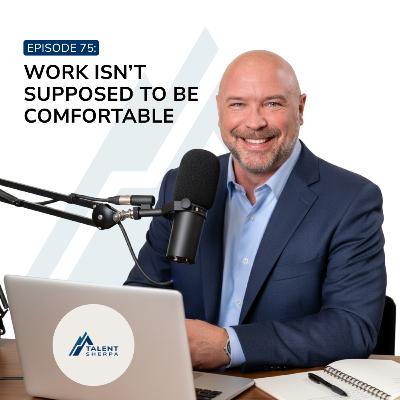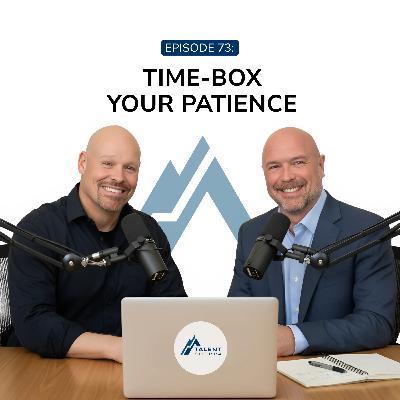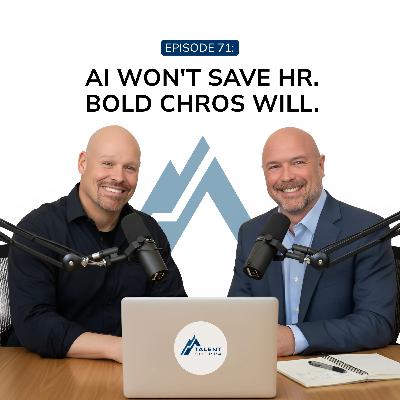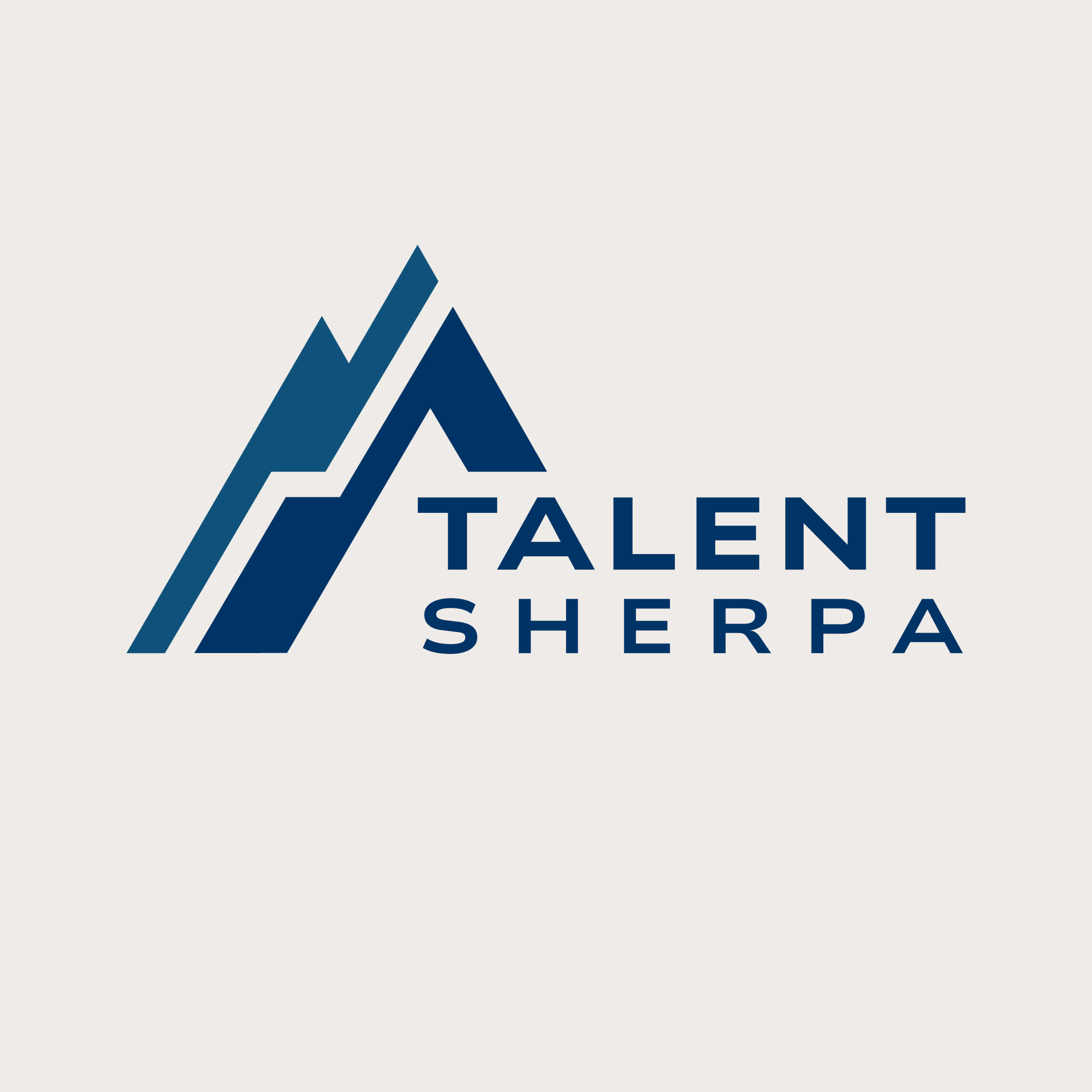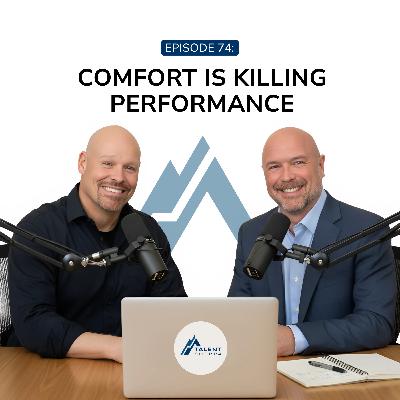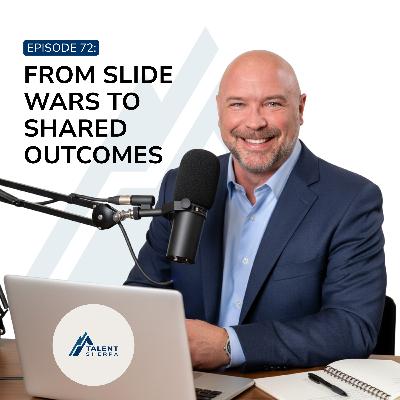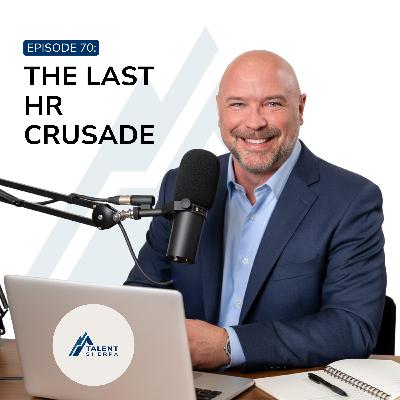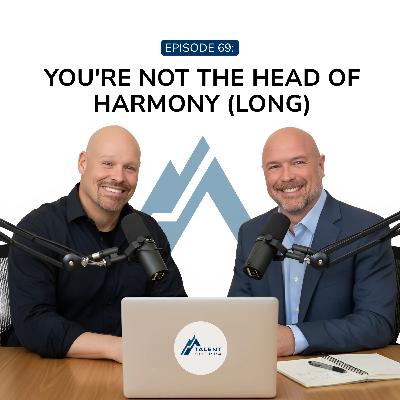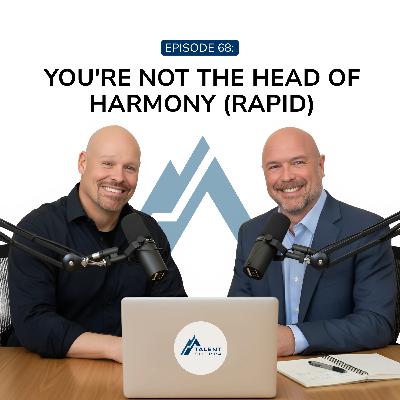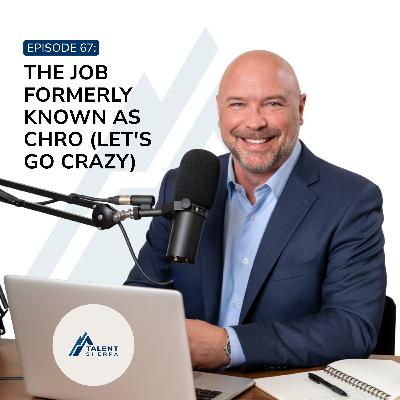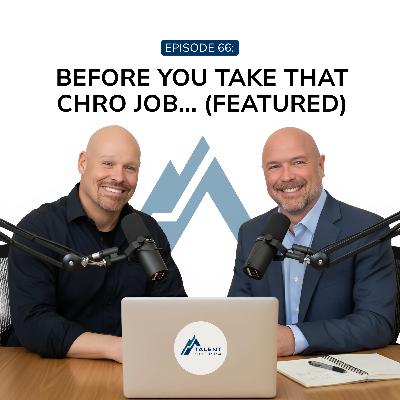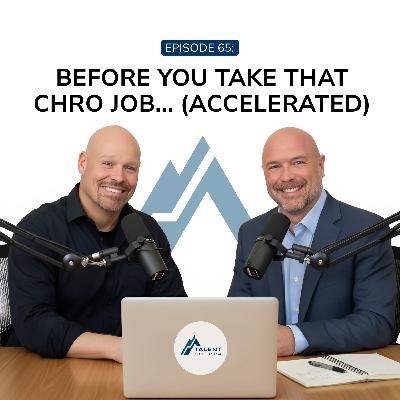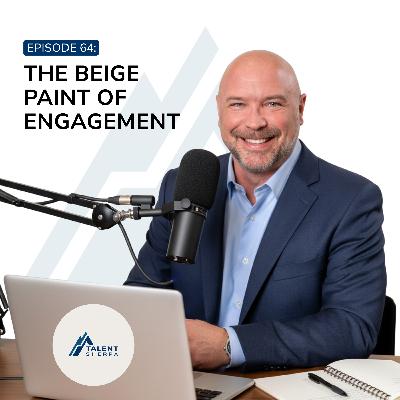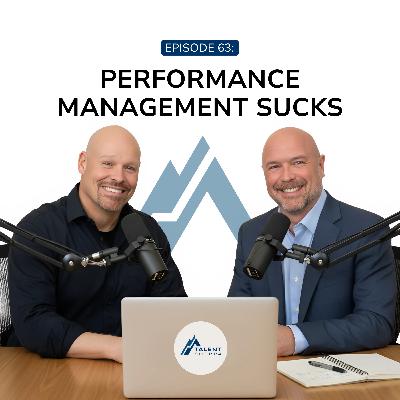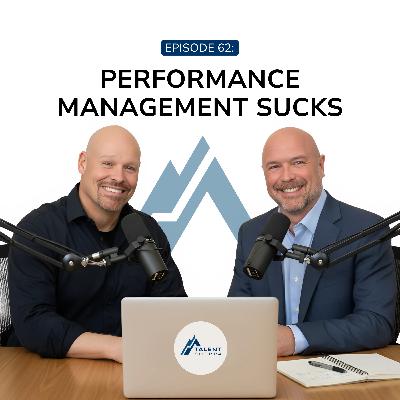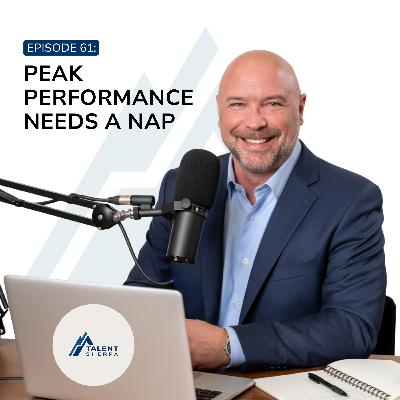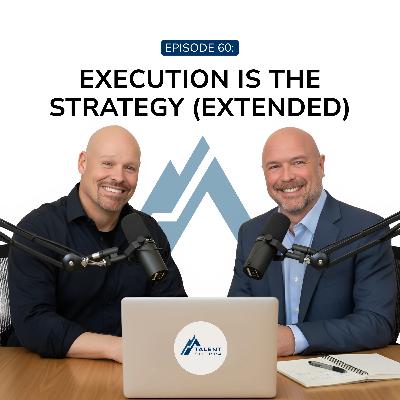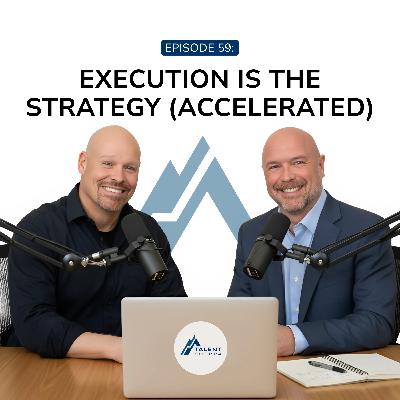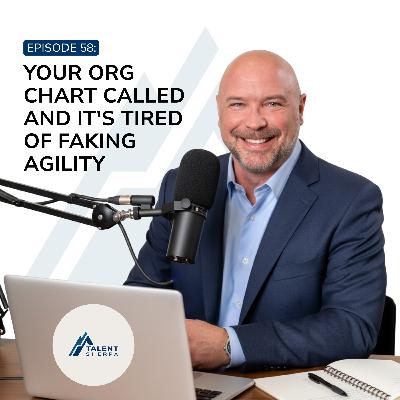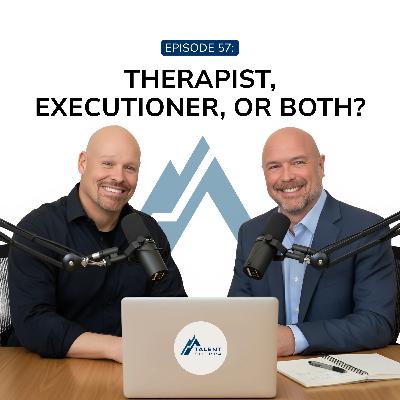Discover The Talent Sherpa Podcast
The Talent Sherpa Podcast

The Talent Sherpa Podcast
Author: Jackson O. Lynch
Subscribed: 0Played: 0Subscribe
Share
© Jackson O. Lynch
Description
The Talent Sherpa Podcast is where senior leaders come to rethink how human capital really works.
Hosted by Jackson Lynch, this podcast cuts through the noise of traditional HR chatter and zeroes in on what actually drives business performance. No fluff. No filler. Just hard-hitting insights, dry humor, and tactical guidance for leaders who are tired of HR metrics that measure motion instead of impact.
Each episode challenges outdated thinking and replaces it with a sharper, more operational approach to talent.
Keep Climbing!
Hosted by Jackson Lynch, this podcast cuts through the noise of traditional HR chatter and zeroes in on what actually drives business performance. No fluff. No filler. Just hard-hitting insights, dry humor, and tactical guidance for leaders who are tired of HR metrics that measure motion instead of impact.
Each episode challenges outdated thinking and replaces it with a sharper, more operational approach to talent.
Keep Climbing!
77 Episodes
Reverse
Is work supposed to be a safe space or a performance space? That was the debate at the SHRM Executive Network Visionaries Conference when Jackson Lynch sat down with SHRM CEO Johnny Taylor. In this episode of the Talent Sherpa Podcast, Jackson takes that conversation deeper, unpacking why leaders have confused psychological safety with comfort, and why that mistake is quietly eroding performance.Real safety matters. Every employee deserves freedom from harassment, retaliation, and bias. But when safety becomes shorthand for protection from discomfort, tough feedback, or accountability, organizations lose their edge. Leaders start pulling punches. Teams lower standards. And mediocrity sneaks in under the banner of psychological safety.This episode lays out a sharper distinction between comfort and safety, with stories from the Seattle Seahawks and the U.S. military, plus practical steps for building a culture where candor fuels performance.Three Key Takeaways:Safety ≠ Comfort: True safety means fairness and candor, not freedom from accountability.Comfort Kills Performance: Shielding people from discomfort leads to mediocrity, not resilience.Clarity is Kindness: High standards plus respect is the formula for sustainable performance.Practical Advice:Set Unambiguous Expectations: Define what success looks like, how it’s measured, and how performance decisions get made.Deliver Candid Feedback as Investment: Frame tough coaching as proof that someone belongs and is needed at their best.Design for Resilience: Pulse the organization, balance tough feedback with recognition, and build capacity to handle discomfort rather than protect people from it.If you are a CHRO looking to start your AI transformation, please check out Getpropulsion.ai.And don't forget to visit www.mytalentsherpa.com where we have tools and coaching for CHROs to make an impact on day one.00:00 - 00:54 The Tension Between Safety and Performance00:54 - 02:27 Discussion at SHRM Executive Network Visionaries Conference02:27 - 04:04 Examples of High-Accountability but Human First Cultures04:04 - 05:47 Blurring the Line Between Comfort and Safety05:47 - 08:07 Practical Steps to Build High-Performance Cultures08:07 - 10:44 Talent Sherpa Key Takeaways
In Episode 73 of the Talent Sherpa podcast, tackles a common but costly myth: that performance management can fix an executive mis-hire. Host Jackson O. Lynch and co-host Scott Morris outline a pragmatic decision flow for CHROs under pressure: confirm the selection, clarify expectations, test whether the role is actually doable, and time-box sprints for role clarification or redesign. If those moves fail, values or judgment gaps call for a fast exit.They dig into why CEOs delay tough calls, how CHROs can stay ahead of issues, and the difference between coaching moments and decision problems. The conversation gets specific on what “good” looks like for new executives, how to pace 30-60-90-180 expectations, and when “moving too slow” is really a misalignment of how work gets done.Jackson shares a candid story about learning alignment in a new culture, and the duo separates healthy egg-breaking from harmful “dead bodies” behavior. The takeaway: CHROs must act as the CEO’s navigator, show the board a disciplined process, and protect A-players by avoiding long goodbyes once the decision is clear.Referenced in this episode: Harvard Business Review notes that a failed executive hire can cost ~10x salary. Read: “The Biggest Mistakes New Executives Make.” Harvard Business ReviewIf you are a CHRO looking to start your AI transformation, please check out Getpropulsion.ai.And don't forget to visit www.mytalentsherpa.com where we have tools and coaching for CHROs to make an impact on day one.
In Episode 71 of the Talent Sherpa Podcast, Jackson O. Lynch and co-host Scott Morris examine the 2025 McKinsey HR Monitor and its tough assessment of the function. HR is lagging at a time when the stakes could not be higher.The discussion begins with workforce planning. Too many organizations are still filling seats instead of building scenario-driven, strategy-aligned plans. The hosts argue for anticipating disruption, planning for skill obsolescence, and designing work by starting with future business needs and working backward.Next comes talent acquisition. With nearly half of new hires failing within 18 months, the traditional hiring process is not working. Jackson and Scott challenge outdated measures such as time to fill and emphasize the real outcome that matters: speed to impact. Success requires sharper role design, structured interviews, and accountability for productivity, not activity.They also highlight how fragmented HR processes undermine results. Development, succession, performance, and employee experience must be integrated around clear outcomes rather than operating in silos. The episode closes with a warning: if CHROs do not lead the AI agenda, IT will, and HR will miss its chance to define the future of work.This is a call for bold leadership. HR must realign around outcomes, embrace AI as a core lever, and move decisively to secure its role as a driver of business performance.
In Episode 45 of the Talent Sherpa Podcast, host Jackson O. Lynch discusses the critical importance of making HR data relevant in business reviews. He emphasizes the need for HR metrics to align with measurable business outcomes, the significance of predictive analytics, and the necessity of simplifying data presentation to enhance clarity and impact. The conversation highlights strategies for HR leaders to effectively communicate their value to executives and drive meaningful business results.Keywords" HR data, business reviews, talent metrics, predictive analytics, employee performance, business outcomes, HR strategy, leadership, talent density, clarity of expectations
In Episode 74 of the Talent Sherpa Podcast, Jackson O. Lynch and co-host Scott Morris take on a common misconception at work: safety has come to mean comfort. They reframe the idea by arguing that high performance requires psychological safety and honest, often uncomfortable conversations. Using Pete Carroll’s “Tell the Truth Monday” as a model, they show how clarity and consequences can coexist with respect and belonging.The discussion gets tactical. Jackson and Scott outline how leaders set outcome clarity first, then coach behavior against those outcomes with precise language. They then shift to the CHRO’s job. CHROs should align the talent philosophy, audit performance management with the same rigor as Finance, and personally coach senior leaders on having direct performance conversations. Jackson shares a real scenario where avoiding clarity in the name of comfort cost a capable employee her spot when the team had to shrink.If you are starting an AI journey in HR and want signal over noise, visit www.getpropulsion.ai for tools that turn people data into business outcomes. If you are an emerging or new CHRO looking to accelerate impact, visit www.mytalentsherpa.com for frameworks, resources, and coaching that help you deliver results fast.
In Episode 72 of the Talent Sherpa Podcast, the spotlight is on the disconnect between finance and talent and what happens when those two conversations finally converge.Executives often hear two different stories: the CFO’s numbers on margin, cash flow, and forecasts, followed by HR’s updates on engagement, retention, and hiring. Both are accurate, but without integration the company misses the bigger picture.The discussion reframes talent as capital, not cost. By bringing forward metrics like revenue per employee, speed-to-impact, and human capital ROI, leaders can align talent decisions with financial outcomes in ways that fuel sustainable growth.This episode offers a practical lens for CHROs and CFOs alike to move from parallel tracks to shared strategy. The payoff: stronger boards, better investments, and fewer reactive cuts.If you are a CHRO looking to start your AI transformation, please check out Getpropulsion.ai.And don't forget to visit www.mytalentsherpa.com where we have tools and coaching for CHROs to make an impact on day one.
In Episode 70 of the Talent Sherpa Podcast, Jackson Lynch challenges HR leaders to rethink what it truly means to be a CHRO by the year 2030. Spoiler alert: "good enough" is already obsolete—and "great" won’t be enough either.Jackson outlines five must-have capabilities that will define the world-class CHRO of the future. From setting the AI and automation agenda (without deferring to IT), to treating talent like capital and making ruthless, data-driven decisions, this episode is packed with insights for leaders who want to lead—not follow.He also dives deep into the importance of business fluency and why the CHRO must evolve from a partner to a true operator. Agility and adaptability aren't buzzwords here—they’re survival strategies. And perhaps most importantly, leadership courage is framed not as a nice-to-have, but as the defining characteristic of the CHRO who will thrive in the decade ahead.If you’re building your roadmap to CHRO in 2030, this is the playbook. Don’t miss it.Start your AI journey at Getpropulsion.aiExplore tools and coaching for CHROs at mytalentsherpa.com
In Episode 69 of the Talent Sherpa Podcast, Jackson O. Lynch and Scott Morris tackle the uncomfortable — and essential — responsibility of the CHRO as the voice of performance truth. They dismantle the “Head of Harmony” myth and explain why avoiding difficult conversations costs organizations more than confronting them.They explore the fine line between politics and political savvy, showing how CHROs can navigate agendas without losing credibility. Through personal stories and practical examples, they break down how to frame feedback in ways that preserve relationships, protect the business, and create lasting cultural impact.Listeners will learn how to prepare for high-stakes conversations with the CEO or peers, how to anchor candor to business outcomes, and how to make radical candor part of the leadership operating system. Jackson and Scott also offer concrete “Monday morning” go-dos so CHROs can start building their truth muscle immediately.If you are ready to lead with clarity, courage, and impact, this conversation delivers a direct playbook.For more leadership insights, visit www.getpropulsion.ai to see how Scott and his team transform HR insights into powerful business outcomes. And check out www.mytalentsherpa.com for resources and coaching designed to help CHROs deliver measurable results from day one.
In Episode 68 of the Talent Sherpa Podcast, Jackson O. Lynch and Scott Morris tackle the uncomfortable and essential responsibility of the CHRO as the voice of performance truth. They dismantle the “Head of Harmony” myth and explain why avoiding difficult conversations costs organizations more than confronting them.They explore the fine line between politics and political savvy, showing how CHROs can navigate agendas without losing credibility. Through personal stories and practical examples, they break down how to frame feedback in ways that preserve relationships, protect the business, and create lasting cultural impact.Listeners will learn how to prepare for high-stakes conversations with the CEO or peers, how to anchor candor to business outcomes, and how to make radical candor part of the leadership operating system. Jackson and Scott also offer concrete “Monday morning” go-dos so CHROs can start building their truth muscle immediately.If you are ready to lead with clarity, courage, and impact, this conversation delivers a direct playbook.For more leadership insights, visit www.getpropulsion.ai to see how Scott and his team transform HR insights into powerful business outcomes. And check out www.mytalentsherpa.com for resources and coaching designed to help CHROs deliver measurable results from day one.
In Episode 67 of the Talent Sherpa Podcast, Jackson Lynch challenges the relevance of the CHRO title and explores why the role has evolved far beyond its original scope. Jackson examines how today’s top HR leaders are no longer administrators of policies but architects of human potential.He breaks down the shift from managing headcount to designing the culture, systems, and capabilities that determine a company’s speed and success. Culture, once considered a “soft” metric, is now a measurable asset tied directly to business outcomes. The episode also dives into the critical move from rigid policy-making toward experimentation, agility, and rapid iteration.Jackson highlights the importance of predictive talent analytics, enabling leaders to anticipate and address challenges before they escalate. He also explains how the modern CHRO’s influence now extends beyond the company walls — shaping talent ecosystems, partnerships, and industry standards.The takeaway: the CHRO title undersells what the best leaders in the role actually do. The future belongs to the Chief Talent and Innovation Officer — a role defined by foresight, measurable impact, and the ability to shape the company’s destiny.A link to Dan Kaplan's Article is here: https://www.zrgpartners.com/insights/chros-are-heading-into-a-retirement-crisis-how-we-take-chro-into-the-future/For tools to transform HR insights into powerful outcomes, visit www.getpropulsion.ai. If you’re an emerging or brand-new CHRO ready to accelerate your impact, head to www.mytalentsherpa.com.
In Episode 66 of the Talent Sherpa Podcast, Jackson Lynch and co-host Scott Morris tackle one of HR’s most stubborn challenges: the deep, systemic misunderstanding of HR’s role in driving business performance. They break down why operational leaders often undervalue HR and how HR leaders themselves sometimes reinforce the very perceptions they want to change.The conversation moves from theory to the real world when Jackson shares a fresh, behind-the-scenes story about being offered a senior HR role during a corporate restructuring and why they both ultimately walked away. The decision came down to alignment: whether the CEO saw HR as a compliance function or a strategic driver of outcomes. The discussion highlights why having a clear, measurable plan for impacting the business through human capital is non-negotiable.Scott underscores the importance of knowing exactly how the business makes and loses money, and of starting every conversation from the business problem rather than an HR activity. Together, they explore how to evaluate potential roles, the signs that a CEO will (or won’t) be a strategic partner, and the hard truth that sometimes the best move is to walk away before you start.Whether you’re a seasoned CHRO, a new CEO, or an HR leader aiming to break out of the “forms and compliance” box, this episode offers practical strategies and candid insights for ensuring you’re in the right role, with the right partner, doing the right work.For more tools and insights to drive business results through human capital, visit www.getpropulsion.ai and www.mytalentsherpa.com.
In Episode 65 of the Talent Sherpa Podcast, Jackson Lynch and co-host Scott Morris tackle one of HR’s most stubborn challenges: the deep, systemic misunderstanding of HR’s role in driving business performance. They break down why operational leaders often undervalue HR and how HR leaders themselves sometimes reinforce the very perceptions they want to change.The conversation moves from theory to the real world when Jackson shares a fresh, behind-the-scenes story about being offered a senior HR role during a corporate restructuring and why they both ultimately walked away. The decision came down to alignment: whether the CEO saw HR as a compliance function or a strategic driver of outcomes. The discussion highlights why having a clear, measurable plan for impacting the business through human capital is non-negotiable.Scott underscores the importance of knowing exactly how the business makes and loses money, and of starting every conversation from the business problem rather than an HR activity. Together, they explore how to evaluate potential roles, the signs that a CEO will (or won’t) be a strategic partner, and the hard truth that sometimes the best move is to walk away before you start.Whether you’re a seasoned CHRO, a new CEO, or an HR leader aiming to break out of the “forms and compliance” box, this episode offers practical strategies and candid insights for ensuring you’re in the right role, with the right partner, doing the right work.For more tools and insights to drive business results through human capital, visit www.getpropulsion.ai and www.mytalentsherpa.com.
In Episode 64 of the Talent Sherpa Podcast, Jackson Lynch challenges leaders to rethink what “ownership” really means. Too often, leaders believe that giving hyper-detailed instructions creates accountability. In reality, it produces compliance. And compliance, Jackson argues, is the beige paint of employee engagement: it covers everything but inspires nothing.Listeners will hear why micromanagement kills ownership faster than anything else, how premature intervention erodes trust, and why employees often hesitate simply because they’ve been trained to wait for permission. Jackson lays out a simple, repeatable leadership shift: ask more questions, give fewer commands, and create clarity on outcomes instead of dictating every action.The conversation also tackles the way organizations reward behavior. Most companies celebrate firefighters (the people who save the day at the last minute) while overlooking the proactive problem-solvers who prevent crises in the first place. Jackson explains why this reward system unintentionally encourages reactive behavior, and how flipping recognition toward true ownership changes culture and performance.The takeaway is clear: employee ownership is a mirror reflecting leadership. If you don’t like what you see, start with your own behaviors. For more on driving business results through people strategy, visit www.getpropulsion.ai to see how AI can transform HR insights into powerful outcomes, and check out www.mytalentsherpa.com for resources designed to help CHROs and senior leaders accelerate their impact from day one.
In Episode 63 of the Talent Sherpa Podcast, Jackson Lynch and Scott Morris tackle the outdated tradition of annual performance reviews—one of the most broken processes in modern organizations. They expose the real costs of clinging to once-a-year evaluations: outdated feedback, frustrated employees, and stagnant growth.Jackson and Scott argue passionately for a shift to real-time, continuous performance conversations that align with today’s fast-paced business world. Drawing parallels from the world of sports coaching, they highlight the absurdity of waiting months to give crucial feedback. Real performance management should be frequent, focused, and actionable—free from the anxiety and drama of annual rituals.They also challenge the misconception that ratings are the issue. The true purpose of ratings, they emphasize, is to recognize and reward high performers consistently—not once a year, but regularly and transparently. Jackson and Scott advocate aligning performance check-ins with quarterly business reviews, transforming talent management into an outcomes-based operating system rather than administrative theatre.For tools to revolutionize your performance management system and align your talent strategy with measurable business results, check out:www.getpropulsion.ai for AI-driven insights and actionable HR analytics.www.mytalentsherpa.com for specialized resources designed for emerging and new CHROs to accelerate their impact immediately.
In Episode 62 of the Talent Sherpa Podcast, Jackson Lynch and Scott Morris tackle the outdated tradition of annual performance reviews—one of the most broken processes in modern organizations. They expose the real costs of clinging to once-a-year evaluations: outdated feedback, frustrated employees, and stagnant growth.Jackson and Scott argue passionately for a shift to real-time, continuous performance conversations that align with today’s fast-paced business world. Drawing parallels from the world of sports coaching, they highlight the absurdity of waiting months to give crucial feedback. Real performance management should be frequent, focused, and actionable—free from the anxiety and drama of annual rituals.They also challenge the misconception that ratings are the issue. The true purpose of ratings, they emphasize, is to recognize and reward high performers consistently—not once a year, but regularly and transparently. Jackson and Scott advocate aligning performance check-ins with quarterly business reviews, transforming talent management into an outcomes-based operating system rather than administrative theatre.For tools to revolutionize your performance management system and align your talent strategy with measurable business results, check out:www.getpropulsion.ai for AI-driven insights and actionable HR analytics.www.mytalentsherpa.com for specialized resources designed for emerging and new CHROs to accelerate their impact immediately.
In Episode 61 of the Talent Sherpa Podcast, Jackson Lynch debunks the common myth that organizational agility is simply about moving faster. He introduces the concept of "rhythm-based agility," arguing that true agility comes from strategically managing team energy, not from frantic activity. Jackson uses relatable analogies—from an uncle moonwalking at a family reunion to elite athletes—to illustrate why constant hustle often leads to burnout rather than sustained success.Listeners learn practical steps for embedding rhythm into their weekly management style, such as balancing high-intensity activities with intentional recovery periods, much like curating a well-rounded playlist. Jackson also confronts the epidemic of nonstop meetings and explains why meaningful "white space" is essential for maintaining creativity, resilience, and high-quality decision-making.Finally, the episode highlights real-world results from companies that have embraced rhythm-based agility, achieving boosts in performance, engagement, and retention. Leaders are challenged to shift their mindsets from equating recovery with wasted time to viewing it as vital insurance for sustainable peak performance.For CHROs and senior leaders eager to transform human capital into strategic impact, visit www.getpropulsion.ai to leverage AI-powered HR insights, and check out www.mytalentsherpa.com for tailored resources to elevate your leadership from day one.
In Episode 60 of the Talent Sherpa podcast, Jackson and Scott tackle HR’s persistent credibility problem. Despite being involved in every stage of the employee lifecycle, many HR functions are still sidelined in strategic discussions. Why? Because great ideas without execution don’t move the business forward.The conversation breaks down the core issue: HR leaders often over-index on programs and underperform in implementation. Jackson explains that strategy isn’t about slide decks or big ideas. It’s about identifying the right business lever, applying the right tactic, and executing quickly and clearly.Scott adds that operational excellence and agile execution are not in conflict. In fact, they work best together. The two explore how HR can build speed without sacrificing quality, why shared ownership with the business is essential, and how CHROs can structure their teams for impact.If you’re building credibility as a CHRO, this is your blueprint. For more tools and guidance, visit www.getpropulsion.ai for AI-powered HR execution, and www.mytalentsherpa.com for coaching and playbooks built for modern HR leaders.00:00 - 03:00 Introduction to HR's Credibility03:00 - 06:30 The Execution Gap06:30 - 10:00 Strategic HR: Beyond Ideas10:00 - 14:00 Building Operational Excellence14:00 - 20:58 The Future of HR20:58 - 29:06 Reclaiming HR's Credibility
This is the Accelerated Version of Episode 60In Episode 59 of the Talent Sherpa podcast, hosts Jackson and Scott tackle HR’s persistent credibility problem. Despite being involved in every stage of the employee lifecycle, many HR functions are still sidelined in strategic discussions. Why? Because great ideas without execution don’t move the business forward.The conversation breaks down the core issue: HR leaders often over-index on programs and underperform in implementation. Jackson explains that strategy isn’t about slide decks or big ideas. It’s about identifying the right business lever, applying the right tactic, and executing quickly and clearly.Scott adds that operational excellence and agile execution are not in conflict. In fact, they work best together. The two explore how HR can build speed without sacrificing quality, why shared ownership with the business is essential, and how CHROs can structure their teams for impact.If you’re building credibility as a CHRO, this is your blueprint. For more tools and guidance, visit www.getpropulsion.ai for AI-powered HR execution, and www.mytalentsherpa.com for coaching and playbooks built for modern HR leaders.
In Episode 58 of the Talent Sherpa Podcast, Jackson Lynch tackles the uncomfortable truth behind traditional org charts: they're built for stability, not speed. But business today demands agility. Jackson introduces "Elastic Teaming," an innovative approach designed to help organizations flex with shifting priorities rather than breaking under pressure.Elastic teams form cross-functional pods that visibly scale and reprioritize work based on the actual needs of the business. Unlike rigid structures that bury employees under endless tasks, elastic teaming keeps priorities clear, ensuring critical initiatives get the attention—and resources—they deserve.Jackson highlights the hidden cost of stagnation, emphasizing that even top talent will disengage if left in static roles. Rotation across pods solves this, injecting fresh energy, perspective, and cross-functional understanding into your teams. The result? Faster, smarter execution, fewer meetings, and an organizational culture driven by visible priorities and shared accountability.Practical, provocative, and timely, this episode provides senior leaders with a fresh blueprint for building resilient teams capable of navigating complexity without losing momentum.Want to learn where to start your AI journey, please join us at getpropulsion.ai. And, if you're a first time or emerging CHRO, we have resources available for you to start delivering value on day one, over at www. mytalentsherpa.com.
In Episode 57 of the Talent Sherpa podcast, Jackson Lynch and co-host Scott Morris unpack one of leadership’s toughest balancing acts: delivering accountability with compassion. They challenge the common misconception that empathy means avoiding hard truths, arguing instead that real compassion involves respectful but direct feedback.Jackson shares stories from his experiences at PepsiCo and Nestlé, illustrating how transparent, feedback-rich cultures build trust and high performance. Scott emphasizes that avoiding tough conversations serves no one. It only prioritizes temporary comfort over long-term organizational health. They also tackle the critical question: should senior executives delegate the responsibility of hard feedback to HR, or must they own it themselves?This conversation will equip you with practical ways to build a feedback-dense culture, navigate uncomfortable conversations gracefully, and ultimately create an environment where your best talent feels seen, valued, and challenged. If you're ready to raise the bar, this one's for you.


